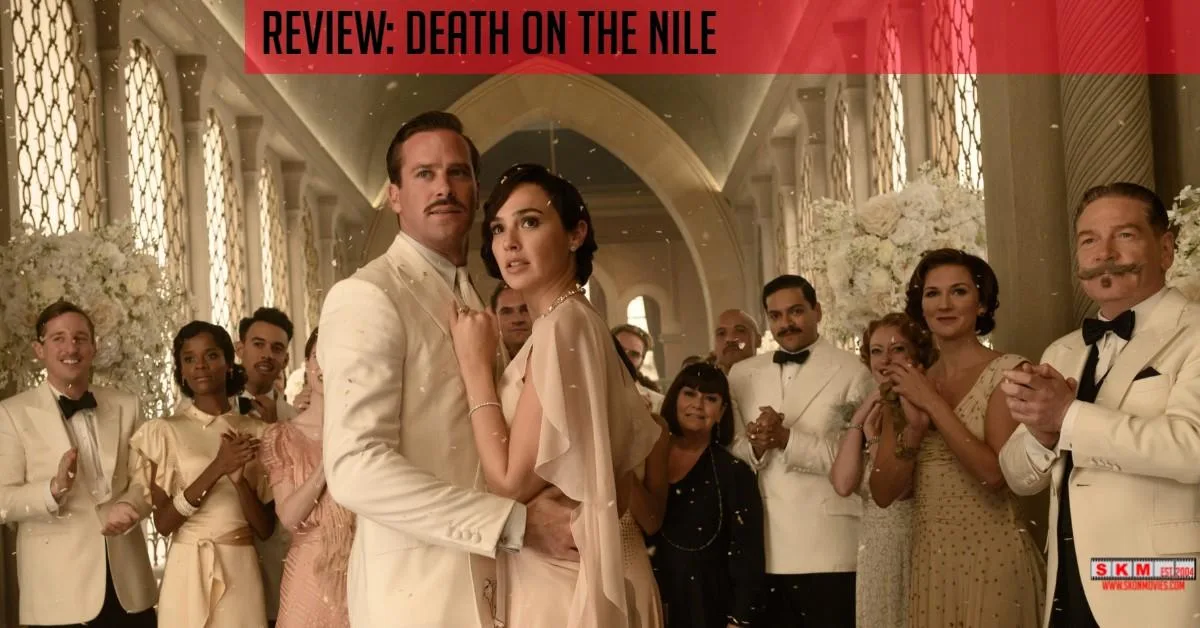Death on the Nile
Subscribe to AMC+ on Prime Video
Hercule Poirot is called upon to investigate a murder on a cruise ship in the Nile river in Death on the Nile. While vacationing in Egypt, Hercule Poirot (Kenneth Branagh) comes across his old friend Bouc (Tom Bateman) and his mother Euphemia (Annette Bening). Bouc invites Poirot to join him at the wedding of wealthy heiress Linnet Ridgeway (Gal Gadot) and Simon Doyle (Armie Hammer), which is also attended by Linnet’s maid Louise Bourget (Rose Leslie), lawyer Andrew Katchadourian (Ali Fazal), doctor Linus Windlesham (Russell Brand), Linnet’s godmother Marie Van Schuyler (Jennifer Saunders) and her companion Mrs. Bowers (Dawn French) and Jazz singer Salome Otterbourne (Sophie Okonedo) with her manager and niece Rosalie (Letitia Wright). Linnet confides in Poirot that she fears for her safety, as she and Simon are being stalked by the latter’s ex-fiance Jacqueline de Bellefort (Emma Mackey), which results in the honeymoon being moved to the cruise ship S.S. Karnak. However, when one of the passengers is later found murdered, it is up to Poirot to question the guests to find the killer.
Death on the Nile is director Kenneth Branagh’s follow-up to his 2017 adaptation of Murder on the Orient Express, with Branagh once again playing the role of the Belgian detective Hercule Poirot. Some adjustments were made from the original novel by Agatha Christie to make Death on the Nile a more oblique follow-up to Murder on the Orient Express, particularly the addition of the returning character of Bouc, once again played by Tom Bateman.
Death on the Nile is probably not a story as well-known to the mainstream as Murder on the Orient Express, however, there have been previous adaptations of the story, particularly a 1978 film directed by John Guillermin and starring Peter Ustinov as Hercule Poirot. As is usually the case with these murder mystery ensembles, Kenneth Branagh’s Death on the Nile features an all-star cast that includes Gal Gadot, Annette Bening, Rose Leslie, Russell Brand, Jennifer Saunders, and Letitia Wright.
One member of the ensemble, who has since become problematic, is Armie Hammer, who plays the very central role of Simon Doyle. It was last year, while Death on the Nile was delayed due to the COVID-19 pandemic when several women accused Armie Hammer of abuse, resulting in him being dropped from not only a number of film projects but also by his talent agency. Since Armie Hammer shot his role in Death on the Nile over a year before the allegations and his character is too central to the plot to easily reshoot, the decision was made to keep him in the film, though this will be the last I speak of him in this review.
Unlike Murder on the Orient Express, I did not know the plot specifics of Death on the Nile, so I ended up finding many specifics of the plot, including the identity of the victim, a surprise as I watched the film. However, in hindsight, the story is actually a quite predictable one, if you truly think about it.
One addition that Kenneth Branagh makes to Death on the Nile is an opening prologue showing Hercule Poirot during the First World War, which not only shows him with his tragically departed wife Katherine (Susannah Fielding) but also gives a practical reason for Poirot’s very distinctive mustache. This scene serves little purpose, other than to give some backstory to Poirot and contribute somewhat to the theme of things people do for love.
While I was undoubtedly drawn in while watching the film, Death on the Nile is ultimately not as memorable a film as Murder on the Orient Express.


 Candlelight concerts bring the magic of a live, multi-sensory musical experience to awe-inspiring locations like never seen before in Toronto. Get your tickets now to discover the music of A.R. Rahman at Metropolitan Community Church of Toronto under the gentle glow of candlelight.
Candlelight concerts bring the magic of a live, multi-sensory musical experience to awe-inspiring locations like never seen before in Toronto. Get your tickets now to discover the music of A.R. Rahman at Metropolitan Community Church of Toronto under the gentle glow of candlelight.